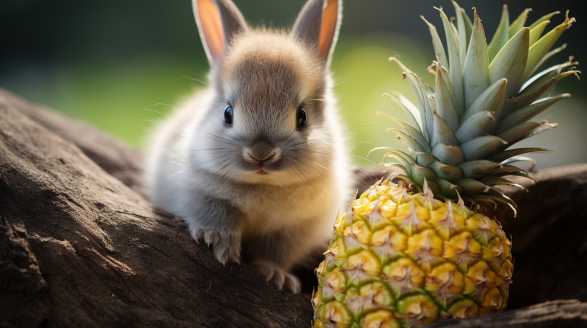Introduction
Hey there, fellow rabbit lovers! Are you ready to hop into a world of pineapple paradise for your fluffy companions? Let’s find out, can rabbits eat pineapple?
I couldn’t be more thrilled to share with you all the juicy details and mouth-watering facts about pineapple and its potential impact on our beloved rabbits’ diets.
Picture this: your precious furball munching on a piece of sweet, tangy pineapple, their little noses twitching with delight as they discover the tropical flavors dancing on their taste buds. But before we dive into this fruity paradise, let’s get one thing straight – pineapples and rabbits?
Get ready to have your bunny brains blown away because we’re about to reveal the truth behind the pineapple frenzy. From the sugar content to the dental benefits, we’ll cover it all.
We won’t just leave you with the basic facts and figures – oh no, we’re going to spice things up! We’ll debunk rabbit diet myths, dish out some delicious pineapple treats, and even reveal some surprising natural remedies for your rabbits’ pearly whites.
So grab your favorite bunny, snuggle up, and get ready for a wild ride through the wonderful world of pineapples and rabbits. From the pros to the cons, the do’s to the don’ts, we’ve got it all covered.
It’s time to unleash the pineapple frenzy and treat your bunnies to an adventure they’ll never forget!
**Do Not Give Any Food To Your Rabbit Without Consulting A Veterinarian, This Article Contains Conventional Wisdom Only.
Key Takeaways
- Pineapple can be safely given to rabbits in moderation as an occasional treat.
- Rabbits have sensitive digestive systems and too much sugar can lead to health issues, so portion control is important.
- Introduce pineapple gradually and monitor your rabbit for any adverse reactions.
- Remove the skin and core before giving pineapple to your rabbit.
- Pineapple offers health benefits such as vitamin C and antioxidants.
- Pineapple can help with tooth wear and has anti-inflammatory properties.
- Consult with a veterinarian before introducing pineapple or any new food into your rabbit’s diet.
- Pineapple should not replace a balanced diet of hay, fresh vegetables, and pellets.
A Comprehensive Guide: Is Pineapple Safe for Rabbits?
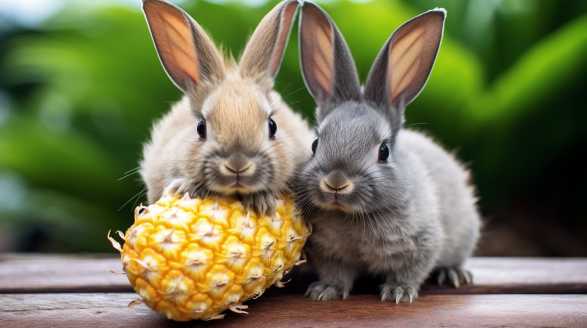
As a pet enthusiast and rabbit owner, I’ve always been curious about the dietary requirements of my furry friend. One of the questions that frequently occupies my mind is whether pineapple is safe for rabbits.
Is Pineapple Safe for Rabbits?
Nutritional Benefits of Pineapple
Before delving into the safety aspect, let’s explore the nutritional benefits of pineapple. Pineapple is a tropical fruit known for its high vitamin C content, which contributes to a strong immune system.
Moreover, pineapple offers a good source of fiber, which aids in maintaining a healthy digestive system.
Moderation is Key
While pineapple can bring certain health benefits, it is crucial to understand that moderation is key. Rabbits have sensitive digestive systems, and sudden changes in their diet can lead to stomach upset or even diarrhea.
Pineapple Consumption Guidelines for Rabbits
To ensure the well-being of your furry companion, follow these guidelines when offering pineapple as a treat:
- Small Portions: Begin by introducing very small portions of pineapple, such as a single bite-sized chunk or a thin slice.
- Observation: Monitor your rabbit’s reaction within the first 24 hours of pineapple consumption. Look for any signs of stomach discomfort, loose stool, or changes in appetite.
- Frequency: Limit pineapple treats to no more than once or twice a week. Too much pineapple can disrupt the delicate balance of your rabbit’s digestive system.
- Preparation: Always serve fresh pineapple. Avoid canned pineapple, as it typically contains added sugars or preservatives that may harm your rabbit’s health.
- Offer Variety: Remember, pineapple should not be the primary treat for your rabbit. Ensure a diverse diet by providing a wide range of rabbit-safe vegetables, hay, and fresh water.
Potential Risks and Considerations
While pineapple can be a healthy and enjoyable treat for rabbits, it is important to be aware of potential risks and consider individual circumstances:
Dental Concerns
Rabbits’ teeth continuously grow, and a diet lacking in fibrous substances can lead to dental issues. Although pineapple contains fiber, its high sugar content may pose a risk to your rabbit’s dental health if consumed excessively.
Allergies or Sensitivities
Just like humans, rabbits can have allergies or sensitivities to certain foods. Introduce pineapple gradually into your rabbit’s diet to check for any adverse reactions.
Underlying Health Conditions
If your rabbit suffers from any existing health conditions, particularly gastrointestinal issues, it is advisable to consult your veterinarian before introducing pineapple into their diet. Some medical conditions may require specific dietary restrictions or modifications, warranting professional guidance.
Healthy Alternatives to Pineapple
If you’re unsure about feeding pineapple to your rabbit or if your rabbit shows signs of sensitivity, consider these healthy alternative treats:
- Berries: Strawberries, raspberries, or blueberries are a great source of antioxidants and vitamins.
- Leafy Greens: Fresh herbs like cilantro, parsley, or lettuce are excellent choices for a healthy snack.
- Carrot Tops: The leafy green part of a carrot can serve as a tasty and nutritious treat.
- Apple Slices: Apples are safe for rabbits when seeds and core are removed. Feed in small quantities due to the high sugar content.
Remember, variety is key to offering a well-balanced diet and keeping your rabbit healthy and happy.
Pineapple can be a safe and nutritious treat for rabbits when offered in moderation and in accordance with the guidelines provided. However, it is essential to monitor your bunny’s response, consider existing health conditions, and provide a diverse diet.
By following these guidelines, you can confidently share a tasty pineapple treat with your furry friend, knowing their health and happiness is paramount.
Understanding the Sugar Content in Pineapple for Rabbits
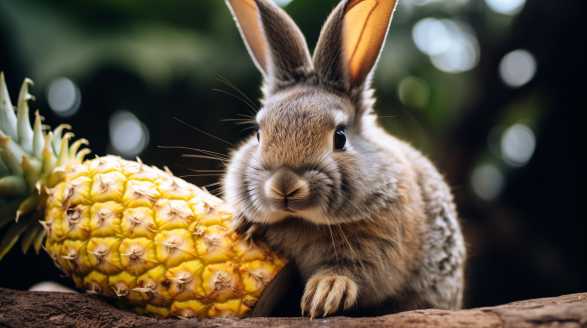
Are you a rabbit owner who loves to spoil your furry friend with a variety of tasty treats? If so, it’s crucial to understand the sugar content in the foods you offer them.
But before you rush to feed your rabbit a delicious chunk of pineapple, let’s explore how much sugar it contains and how it can impact your bunny’s well-being.
The Sweet Taste of Pineapple
There’s no denying that pineapple has a deliciously sweet taste that appeals to many of us humans. This tropical fruit is loaded with various nutrients, such as vitamins A and C, manganese, and dietary fiber.
Excessive Sugar and Its Impact on Rabbits
Rabbits have a unique digestive system that requires a high-fiber, low-sugar diet to maintain their overall well-being. When rabbits consume too much sugar, it can lead to numerous health issues, including:
- Digestive problems: The delicate balance of a rabbit’s gut can be disrupted by excessive sugar consumption, leading to bloating, diarrhea, and discomfort.
- Obesity: Just like in humans, too much sugar can cause weight gain in rabbits. This, in turn, can put strain on their bones and joints, leading to a decrease in mobility and overall quality of life.
- Dental issues: Rabbits have continuously growing teeth, and a high-sugar diet can contribute to dental problems such as tooth decay and overgrown teeth.
The Sugar Content in Pineapple
To truly understand whether pineapple can be included in your rabbit’s diet, we need to take a closer look at its sugar content. On average, pineapple contains approximately 9 grams of sugar per 100 grams.
Moderation is Key
Now that we know the sugar content in pineapple, it’s essential to remember that moderation is key when offering this fruit to your rabbit. Here are some guidelines to follow:
- Treat size: Limit pineapple treats to small chunks or slices approximately the size of a grape or blueberry.
- Frequency: Offer pineapple treats no more than once or twice a week, allowing plenty of time for their digestive system to adjust.
- Variety: Remember that a rabbit’s diet should primarily consist of hay, fresh vegetables, and a small amount of pellets. Pineapple should always be an occasional addition to their diet, not a staple food.
Introducing Pineapple Safely
Introducing any new food into a rabbit’s diet should be done gradually. Pineapple is no exception.
- Start small: Begin by offering your rabbit an extremely tiny piece of pineapple and observe their reaction. If they tolerate it well, you can gradually increase the portion size over time.
- Watch for adverse reactions: Keep a close eye on your bunny for any signs of digestive upset or changes in behavior. If you notice any adverse reactions, immediately remove pineapple from their diet and consult with a veterinarian.
- Balance their diet: Pineapple treats should always be balanced with an appropriate amount of hay, fresh leafy greens, and rabbit-safe vegetables. This will help provide the necessary fiber and other essential nutrients that your rabbit needs.
Understanding the sugar content in pineapple for rabbits is crucial for responsible pet ownership. While pineapple can be a delightful treat for your bunny, it should never become a mainstay of their diet.
Remember, a happy rabbit is a healthy rabbit!
Pineapple or Forbidden Fruit? Debunking Rabbit Diet Myths
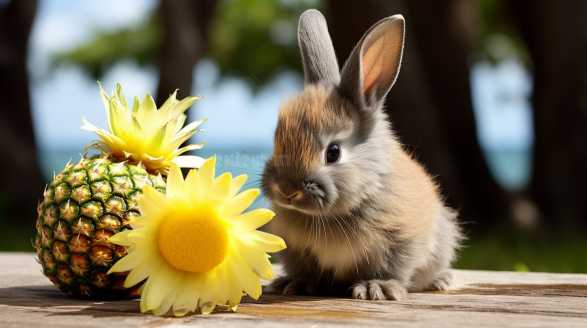
I must admit, when I first became a rabbit owner, I was absolutely perplexed about what to feed my furry friend. With all the conflicting information out there, it felt like navigating a jungle of misinformation.
It was like the forbidden fruit of the rabbit kingdom. So, I set out on a mission to debunk some of the most common rabbit diet myths and bring some clarity to the pineapple puzzle.
Myth 1: Pineapple Is a Forbidden Fruit for Rabbits
Let’s tackle the pineapple dilemma head-on. Contrary to popular belief, pineapple is not a forbidden fruit for rabbits.
However, there are a few important guidelines to keep in mind:
- Moderation is key. Pineapple contains a high amount of natural sugars, so it should only be given in small amounts.
- Introduce pineapple gradually. Just like with any new food, it’s essential to introduce it slowly to avoid any digestive upsets.
- Remove the skin and core. The skin and core of the pineapple are not digestible for rabbits and can pose a choking hazard. Make sure to only offer the juicy flesh.
Myth 2: Rabbits Can Live on Carrots Alone
Ah, Bugs Bunny—the ultimate carrot enthusiast. While it may seem like rabbits can thrive on carrots alone, this is far from the truth.
Here’s why:
- Carrots are high in sugar. Feeding rabbits excessive amounts of carrots can lead to weight gain, dental issues, and digestive problems.
- A balanced diet is crucial. Just like humans, rabbits need a variety of nutrients to stay healthy. Their diet should primarily consist of hay, fresh vegetables, and a small amount of high-quality pellets.
Myth 3: All Fruits Are Safe for Rabbits
Fruits are often seen as a healthy snack for humans, but not all fruits are suitable for our furry friends. While rabbits can enjoy some fruits, others can be harmful to their health.
- Safe fruits for rabbits:
- Apples (remove seeds and core)
- Berries (strawberries, raspberries, blueberries)
- Melons (watermelon, cantaloupe)
- Kiwi (in small amounts)
- Papaya (in moderation)
- Fruits to avoid:
- Grapes (can cause kidney damage)
- Cherries (contain pits that can be toxic)
- Citrus fruits (high in acid, can cause tummy upset)
- Stone fruits (peaches, plums, apricots) – pits can be toxic
Myth 4: Rabbits Can Safely Graze on Any Plant in the Garden
Oh, the joys of gardening! While rabbits may seem like natural gardeners, it’s essential to be aware of the potential dangers lurking in your backyard.
- Rhubarb: The leaves contain toxic levels of oxalic acid, which can cause kidney damage.
- Lily of the Valley: This beautiful plant contains cardiac glycosides, which can be fatal if ingested.
- Daffodil: All parts of the daffodil plant are toxic to rabbits, especially the bulbs.
Before allowing your rabbit to graze freely in the garden, make sure the plants are safe and non-toxic. It’s always better to be safe than sorry.
Myth 5: Unlimited Pellets Are the Solution
Pellets often play a significant role in a rabbit’s diet, providing essential nutrients. However, unlimited access to pellets can have detrimental effects on their health.
- Control portion sizes. Rabbits should receive no more than 1/4 cup of pellets per 5 pounds of body weight per day. Overfeeding pellets can lead to obesity and digestive issues.
- Hay is crucial. The bulk of a rabbit’s diet should consist of high-quality hay, which helps maintain healthy digestion and wears down their teeth.
Busting Rabbit Diet Myths for a Healthy Bunny
It’s essential to approach rabbit nutrition with caution and debunk the myths that may confuse and mislead us. By providing a well-balanced diet of hay, fresh vegetables, and appropriate treats in moderation, you can ensure that your bunny stays happy and healthy.
Remember, when it comes to pineapple, it’s not forbidden fruit for rabbits. Just offer it as an occasional treat, remove the skin and core, and watch your furry friend hop with delight.
The Do’s and Don’ts: Can Rabbits Safely Enjoy Pineapple Treats?
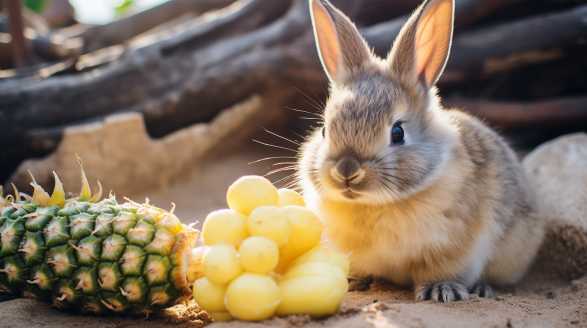
As a rabbit owner, I am always on the lookout for new and exciting treats to give to my furry friend. Recently, I came across the idea of giving rabbits pineapple treats.
I will discuss the do’s and don’ts of feeding rabbits pineapple treats and provide you with all the information you need to make an informed decision for your furry companion.
Can Rabbits Eat Pineapple?
The short answer is, yes, rabbits can eat pineapple. However, like with any fruit or treat, it is important to exercise caution and moderation in order to keep your rabbit healthy.
The Do’s of Feeding Pineapple Treats to Rabbits
When offering pineapple treats to your rabbit, there are a few important do’s that you should follow:
- Introduce slowly: Rabbits have sensitive digestive systems, so it’s crucial to introduce pineapple gradually. Start by offering a small piece and observe how your rabbit reacts.
- Choose ripe pineapple: Opt for ripe pineapple, as it tends to be sweeter and easier to digest. Avoid giving your rabbit unripe or overripe pineapple, as it can cause digestive upset.
- Serve in small portions: Pineapple should only be given as an occasional treat, not as a regular part of your rabbit’s diet. Limit the serving size to a small piece, about the size of your thumb.
- Fresh and organic: Always choose fresh, organic pineapple without added sugars or preservatives. These artificial additives can be harmful to your rabbit’s health.
- Use as a training aid: Pineapple’s sweet and tangy taste can be a great motivator during training sessions. Offer small pineapple treats as rewards to reinforce positive behavior in your rabbit.
The Don’ts of Feeding Pineapple Treats to Rabbits
While there are certain do’s when it comes to feeding rabbits pineapple treats, there are also a few don’ts to bear in mind:
- Avoid canned pineapple: Canned pineapple often contains added sugars and preservatives, making it unsuitable for rabbits. Stick to fresh pineapple for your furry friend.
- Don’t overdo it: Pineapple, like any treat, should be given in moderation. Too much pineapple can cause digestive issues or upset your rabbit’s delicate balance.
- Remove the core and skin: Before offering pineapple to your rabbit, make sure to remove the tough core and prickly skin. These parts can be difficult to chew and digest for your bunny.
- Avoid serving together with other high sugar treats: Pineapple is already naturally sweet, so avoid pairing it with other high sugar treats. This can lead to an excessive sugar intake, which may not be suitable for rabbits.
- Observe for any adverse reactions: After introducing pineapple to your rabbit, monitor for any signs of discomfort or adverse reactions, such as diarrhea or bloating. If any issues arise, discontinue feeding pineapple and consult your veterinarian.
Additional Considerations
While pineapple can be enjoyed by rabbits, it’s important to remember that it should never replace their staple diet of hay, fresh greens, and pellets. Treats, including pineapple, should only make up a small portion of their overall diet.
It’s essential to consult your veterinarian before introducing any new treats into your rabbit’s diet. They can provide specific guidance based on your rabbit’s individual needs and health conditions.
Rabbits can safely enjoy pineapple treats when given in moderation and following the do’s and don’ts mentioned above. Pineapple can be a refreshing and tasty addition to your rabbit’s diet, but it should never replace their main sources of nutrition.
The Nutritional Benefits of Pineapple for Rabbits
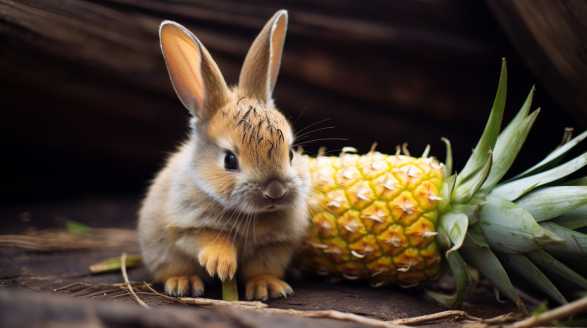
As a dedicated rabbit owner, finding the right diet for your furry friend is essential to their overall health and well-being. While rabbits have specific dietary needs, it’s always exciting to discover new and tasty treats that offer nutritional benefits.
Yes, you heard it right. Pineapple is not only delicious, but it also provides several advantages for your adorable bunnies.
Why Pineapple?
Pineapple is a tropical fruit that is known for its sweet and tangy taste. It is abundant in essential vitamins, minerals, and natural enzymes that can boost your rabbit’s health in various ways.
1. Rich in Vitamin C
Pineapple is packed with vitamin C, a crucial nutrient that promotes a strong immune system in rabbits. Just like humans, rabbits cannot produce their own vitamin C and must obtain it from their diet.
2. Provides Fiber
Fiber is a fundamental component of a rabbit’s diet, as it aids in maintaining a healthy digestive system. Pineapple contains dietary fiber, which can improve your rabbit’s overall digestive health and prevent issues such as gastrointestinal stasis.
3. Contains Antioxidants
Antioxidants play a significant role in preventing cell damage caused by free radicals in the body. Pineapple is a rich source of antioxidants that can contribute to your rabbit’s long-term health and well-being.
4. Natural Enzymes for Digestion
One of the most unique benefits of pineapple is its enzymes, specifically bromelain. Bromelain helps break down proteins and aids in digestion.
Considerations when Feeding Pineapple to Rabbits
While pineapple can offer numerous health benefits, it’s crucial to feed it to your rabbits in moderation. Remember, rabbits have sensitive digestive systems, and sudden changes in their diet can lead to gastrointestinal upset.
1. Consult with a Vet
Before introducing any new food into your rabbit’s diet, it’s essential to consult with a rabbit-savvy veterinarian. They can provide tailored advice based on your rabbit’s specific dietary needs and health condition.
2. Introduce Pineapple Slowly
Start by offering your rabbit a small piece of pineapple, about the size of a thumbnail, and observe how they react after consuming it. If your rabbit shows no adverse reactions, you can gradually increase the amount over time.
3. Limit Quantity and Frequency
Pineapple should be given as an occasional treat rather than a regular part of your rabbit’s daily diet. Too much pineapple can upset their digestive system due to its high sugar content.
4. Choose Fresh Pineapple
Always opt for fresh, ripe pineapple over canned or processed versions. Fresh pineapple retains its maximum nutritional content, making it a healthier choice for your rabbits.
5. Remove the Skin and Core
Before offering pineapple to your rabbit, ensure that you remove the tough outer skin and the fibrous core. These parts are difficult for rabbits to digest and can pose a choking hazard.
Fun Ways to Serve Pineapple to Rabbits
Now that you know the nutritional benefits and considerations, let’s explore some exciting ways to serve pineapple to your rabbits:
1. Pineapple “Kebabs”
Slice a few small pieces of pineapple and thread them onto a wooden skewer or a safe rabbit treat toy. Your rabbits will enjoy the challenge of nibbling on the pineapple while having some playtime.
2. Pineapple Ice Cubes
Create refreshing pineapple ice cubes by blending pineapple chunks with water and freezing them in an ice cube tray. These icy treats can be a superb way to cool down your bunnies during hot weather.
3. Pineapple Hide-and-Seek
Hide small pieces of pineapple around your rabbit’s play area or in safe treat toys. This interactive game will stimulate your rabbits’ natural foraging instincts and keep them entertained.
4. Pineapple Smoothies
Blend pineapple chunks with a selection of rabbit-safe fruits and vegetables, such as broccoli and kale, to create a delicious smoothie. Serve the smoothie in a shallow dish for your rabbits to lap up.
Incorporating pineapple as an occasional treat in your rabbit’s diet can provide an array of nutritional benefits. From vitamin C to fiber and natural enzymes, pineapple can enhance your bunny’s overall health and contribute to their happiness.
So, why not surprise your adorable rabbits with a tropical twist by adding pineapple to their treat menu? Your bunnies will surely hop with joy!
The Proper Pineapple Portion for Your Rabbits: Quantity and Frequency
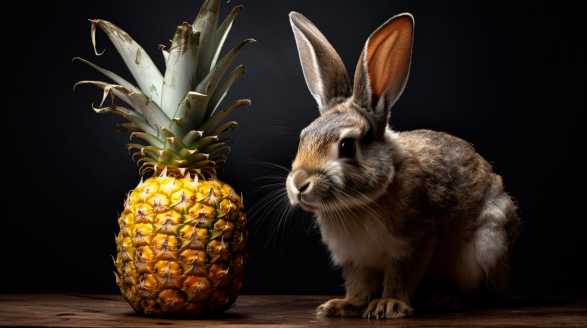
When it comes to the health and well-being of our adorable little furry friends, it’s essential to provide them with a well-balanced diet. While rabbits are primarily herbivores, their diet can and should include a variety of fruits to ensure they receive all the necessary nutrients.
we will explore the proper portion size and frequency of pineapple for rabbits to help you make informed dietary choices for your beloved pets.
The Proper Portion Size
Rabbits have unique dietary requirements, and it’s crucial not to overwhelm their delicate digestive systems with excessive amounts of any food, including pineapple. The proper portion size of pineapple for rabbits is approximately one to two tablespoons per week.
Frequency of Feeding Pineapple
While one to two tablespoons a week may not sound like much, it’s essential to remember that rabbits have sensitive stomachs, and sudden dietary changes can lead to gastrointestinal issues. Therefore, it’s best to introduce pineapple gradually and observe how your rabbit reacts.
Initially, you can offer your rabbit a tiny piece, about the size of a pea, and see if they show any signs of discomfort or digestive problems. If they tolerate it well, you can gradually increase the amount to the recommended portion size of one to two tablespoons per week.
Signs of Overfeeding
Just like humans, rabbits can have too much of a good thing. Overfeeding pineapple to your rabbit can lead to digestive issues, including loose stools and diarrhea.
Some common signs of overfeeding pineapple include:
- Loose stools or diarrhea
- Reduced appetite
- Changes in behavior (lethargy or restlessness)
- Abdominal discomfort (hunched posture or unwillingness to be touched)
If you notice any of these symptoms, it’s essential to reduce the amount of pineapple and consult with a veterinarian if the symptoms persist.
Other Fruits for Rabbits
While pineapple can be a healthy addition to your rabbit’s diet, it’s important to note that variety is key. Rabbits thrive on a well-rounded diet that includes a mix of hay, fresh greens, vegetables, and a moderate amount of fruits.
Here are some other rabbit-friendly fruits you can offer in addition to pineapple:
- Apples (remove seeds and core)
- Bananas (in moderation due to high sugar content)
- Berries (strawberries, blueberries, raspberries)
- Melons (watermelon, cantaloupe)
- Papaya
- Pear (remove seeds and core)
- Kiwi
Remember, when introducing any new food, it’s crucial to do so gradually and monitor your rabbit’s reaction.
Pineapple can be a tasty and nutritious treat for your rabbits when fed in the proper portion size and frequency. Offering one to two tablespoons of pineapple per week ensures that your furry friend receives the benefits of this tropical fruit without overwhelming their delicate digestive system.
Remember to introduce pineapple gradually and observe your rabbit’s reaction for any signs of digestive issues. If any symptoms occur, adjust the portion size accordingly and consult with a veterinarian if necessary.
Lastly, don’t forget to provide your rabbits with a well-rounded diet that includes a mix of hay, fresh greens, vegetables, and a variety of rabbit-friendly fruits. Your adorable little friends deserve a healthy and balanced diet to thrive and live their best lives!
The Pros of Pineapple Juice for Rabbits
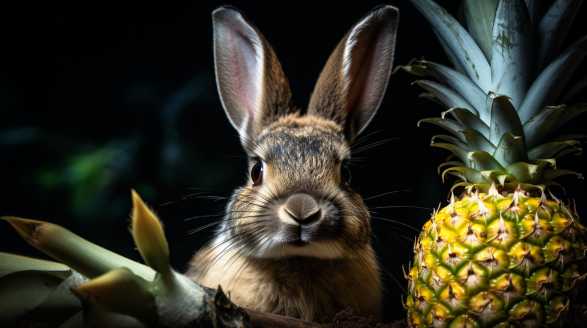
There are a few potential benefits that pineapple juice can offer to rabbits when given in small amounts. Here are the pros:
- Vitamin C Boost: Pineapple juice is rich in vitamin C, an essential nutrient for rabbits. Vitamin C helps maintain a strong immune system, promotes healthy skin and coat, and aids in the growth and repair of tissues.
- Hydration: Rabbits, like all animals, need to stay hydrated. Pineapple juice can be diluted with water to provide a refreshing and flavorful drink that encourages rabbits to drink more. Proper hydration is crucial for the overall health and well-being of rabbits.
- Variety in Diet: Introducing new flavors and textures to your rabbit’s diet can keep things interesting. Pineapple juice, when given in small amounts, can add a sweet and tangy twist to their daily meals.
- Source of Bromelain: Pineapple juice contains an enzyme called bromelain, which has anti-inflammatory properties. While there is limited research on the effects of bromelain in rabbits, it is believed to provide some digestive benefits.
The Cons of Pineapple Juice for Rabbits
While pineapple juice does have some potential benefits, it’s important to be aware of the possible drawbacks. Here are the cons:
- High Sugar Content: Pineapple juice is naturally high in sugar. Rabbits have a unique digestive system that is sensitive to sugary foods. Excessive sugar intake can disrupt their gut flora and lead to digestive problems, such as bloating and diarrhea.
- Acidity: Pineapple juice is acidic in nature, which can cause stomach upset and irritation in rabbits. Just like humans, rabbits can also experience acid reflux when consuming acidic foods.
- Potential Tooth Decay: The sugar content in pineapple juice, if consumed in large quantities or too frequently, can contribute to dental issues in rabbits. Rabbits’ teeth grow continuously, and a diet high in sugars can lead to overgrowth, malocclusion, and painful dental problems.
- Allergic Reactions: Some rabbits may be allergic to pineapple or its components. Signs of an allergic reaction can include digestive upset, skin irritation, or respiratory issues. Always introduce pineapple juice slowly and watch for any adverse reactions.
Guidelines for Feeding Pineapple Juice to Rabbits
If you decide to go ahead and offer pineapple juice to your rabbit, here are some important guidelines to follow:
- Moderation is Key: Pineapple juice should only be given to rabbits in small amounts as an occasional treat. Limit the frequency and quantity to prevent potential health issues associated with excessive sugar intake.
- Dilute with Water: Always dilute pineapple juice with water before offering it to your rabbit. A 50/50 ratio of juice to water is a good starting point. This helps reduce the sugar content and acidity, making it gentler on their digestive system.
- Fresh and Natural: Opt for fresh pineapple juice without any added sugars or preservatives. Artificial sweeteners and additives can be harmful to rabbits.
- Observe and Adapt: Watch your rabbit closely after introducing pineapple juice to their diet. Look for any signs of digestive upset or allergic reactions. If any negative symptoms occur, discontinue the use of pineapple juice immediately.
So, there you have it – the pros and cons of feeding pineapple juice to rabbits. It’s always exciting to explore new ways to treat our furry companions, but it’s equally important to approach it with caution.
If you do decide to offer pineapple juice to your rabbit, remember to do so in moderation, dilute it with water, and observe your rabbit’s response closely. As responsible rabbit owners, it’s our duty to prioritize their health and well-being above all else.
Can Pineapple Cause Digestive Issues in Rabbits?
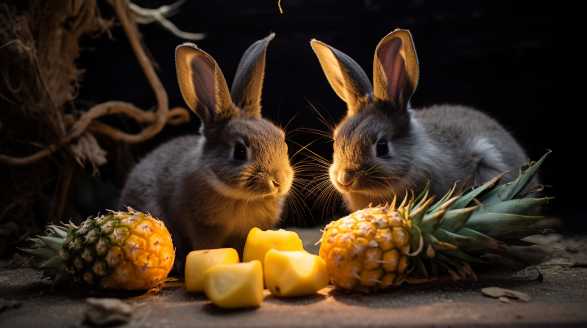
As a pet owner and rabbit enthusiast, I am always on the lookout for the best dietary choices for my furry friends. Recently, the question of whether pineapples can cause digestive issues in rabbits has been on my mind.
So, let’s explore the potential impact of pineapples on a rabbit’s digestive system.
Understanding Rabbits’ Digestive System
Before delving into the pineapple debate, it’s crucial to understand how a rabbit’s digestive system works. Rabbits are unique creatures with a sensitive digestive system designed to process fibrous plant material efficiently.
Rabbits have a complex digestive process that involves two different types of feces: hard feces and cecotropes. The former passes through their system undigested and is typically eliminated.
Pineapple: Nutritional Facts
Pineapples are not only delicious, but also packed with nutrients. They are a good source of vitamins A and C, as well as dietary fiber.
Despite its nutritious profile, we need to explore whether rabbits can safely enjoy pineapples without risking digestive distress.
The Potential Risks of Feeding Pineapple to Rabbits
While pineapples offer nutritional value, they may not be the most suitable choice for rabbits due to several factors:
- High Sugar Content: Pineapples are naturally sweet and contain a significant amount of sugar. Rabbits have sensitive digestive systems that are not adapted to process high levels of sugar. Introducing excessive sugar into their diet excessively can disrupt their gastrointestinal balance, leading to digestive problems.
- Acidity: Pineapples are known for their acidity, which can be harsh on the delicate digestive system of rabbits. High acidity levels can potentially cause discomfort, irritation, and even ulceration in the digestive tract.
- Bromelain Controversy: While bromelain is beneficial for humans, its effects on rabbits remain unclear. Some sources suggest that bromelain may cause stomach upset in rabbits when consumed in excess. This enzyme might disrupt the natural bacteria in a rabbit’s gut, leading to digestive imbalances and potential problems.
Moderation is Key
While the risks mentioned above indicate caution, it is important to note that introducing small amounts of pineapple into your rabbit’s diet may not always lead to digestive issues. Moderation and careful observation are key when deciding to offer pineapples as a treat.
1. Consult with a Veterinarian
Before introducing any new food to your rabbit’s diet, it’s always a good idea to consult with a veterinarian. A qualified professional will be able to provide specific advice based on your rabbit’s unique health needs and dietary requirements.
2. Serve Small Portions
If your veterinarian approves adding pineapple to your rabbit’s diet, start by offering tiny portions as an occasional treat. Monitor your rabbit closely for any signs of gastrointestinal distress, such as loose stool or reduced appetite.
3. Ensure Freshness and Quality
When giving pineapples to your rabbit, make sure they are fresh and of high quality. Overripe fruits with a higher sugar content can be even more problematic.
4. Offer Variety in Moderation
Remember that pineapples should never replace a rabbit’s staple diet of hay and leafy greens. It’s essential to keep a balanced diet that meets all your rabbit’s nutritional requirements.
While rabbits can indeed derive some nutritional benefit from pineapples, it’s important to exercise caution when introducing them into their diet. The high sugar content, acidity, and potential impact of bromelain make it crucial to proceed with moderation.
Ultimately, the health and well-being of our furry friends should always be our top priority.
Pineapple as a Natural Remedy for Rabbit Dental Health
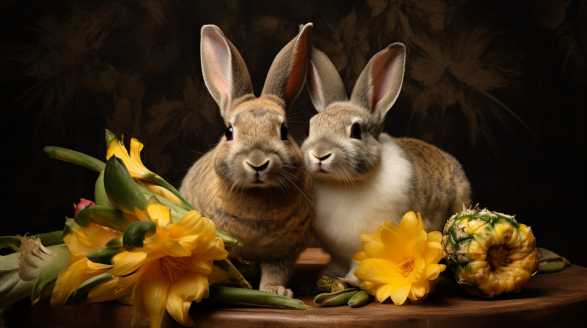
As a rabbit owner, I am always on the lookout for natural remedies to improve the health and well-being of my furry friend. Recently, I stumbled upon an interesting fact – pineapple can be a great natural remedy for rabbit dental health.
Why is Rabbit Dental Health Important?
Before we dive into the benefits of pineapple for rabbit dental health, let’s understand why proper dental care is crucial for our furry friends. Rabbits, like many other small animals, have continuously growing teeth.
Without adequate dental care, a rabbit’s quality of life can significantly decline.
The Importance of Natural Remedies
As a responsible pet owner, I always prefer using natural remedies whenever possible. Natural remedies not only have fewer side effects but can also be cost-effective.
Let’s explore them below.
The Benefits of Pineapple for Rabbit Dental Health
1. Enzymes that Aid in Tooth Wear
Pineapple contains bromelain, an enzyme known for breaking down protein. This enzyme can help rabbits wear down their teeth naturally.
Including pineapple in their diet can provide an extra boost in maintaining healthy teeth.
2. Natural Source of Vitamin C
Vitamin C plays a crucial role in maintaining overall dental health in rabbits. Pineapple is a rich source of vitamin C, which helps support strong teeth and gums, preventing issues such as bleeding gums and tooth loss.
3. Anti-Inflammatory Properties
If your rabbit is suffering from dental issues, such as inflammation or abscesses, pineapple’s anti-inflammatory properties can come to the rescue. Bromelain, the enzyme found in pineapple, has been shown to significantly reduce inflammation and promote healing.
4. Hydration
Proper hydration is crucial for preserving dental health. Pineapple has a high water content, making it an excellent natural choice to keep your rabbit hydrated.
5. A Treat Your Rabbit Will Love
Introducing new foods to rabbits can sometimes be a challenge, but pineapple usually wins them over with its sweet taste. Not only is pineapple a beneficial addition to their diet, but it also adds variety and excitement to their meals.
and their tolerance for pineapple may vary. Always observe your rabbit’s reaction and tailor their diet accordingly.
Who would have thought that pineapple could be such a beneficial natural remedy for rabbit dental health? From aiding in tooth wear to providing anti-inflammatory effects, pineapple offers a range of advantages for maintaining healthy teeth and gums in rabbits.
So go ahead, grab a juicy slice of pineapple, and treat your rabbit to a dental health boost they’ll love!
How to Introduce Pineapple to Your Rabbit’s Diet

Hi there! If you’re reading this article, I assume you’re looking to add some variety to your rabbit’s diet and have stumbled upon the idea of introducing pineapple.
I’ll share everything you need to know about incorporating pineapple into your furry friend’s nutrition plan.
The Basics: Getting Started
Before diving into serving pineapple to your rabbit, there are a few essential things you need to know:
1. Consult your vet:
It’s always a good idea to consult your veterinarian before making any significant changes to your rabbit’s diet. They can provide specific insights into your bunny’s individual needs and offer tailored advice.
2. Introduce slowly:
As with any new food, it’s important to introduce pineapple to your rabbit gradually. Start with small amounts to avoid upsetting their digestive system.
3. Fresh and ripe:
Choose a fresh and ripe pineapple to ensure maximum nutritional benefits. Avoid canned or processed versions as they may contain added sugars or preservatives that are not suitable for rabbits.
Health Benefits of Pineapple for Rabbits
Now that we’ve covered the basics, let’s look into the fantastic health benefits that pineapple can provide to your furry companion:
1. Vitamin C:
Pineapple is an excellent source of vitamin C, which is essential for maintaining a rabbit’s overall immune system function and overall health.
2. Antioxidants:
Pineapple contains antioxidants that help combat free radicals in your rabbit’s body, reducing the risk of cell damage and inflammation.
3. Hydration:
Pineapple has a high water content, which can help keep your rabbit hydrated, particularly during warmer months.
Serving Pineapple to Your Rabbit
Here are some easy-to-follow steps to safely introduce pineapple to your rabbit’s diet:
1. Start small:
Begin by offering a small piece of pineapple, roughly the size of a dime, as a treat. Observe your rabbit’s reaction and monitor their digestion for any adverse effects.
2. Monitor for allergies:
Just like humans, some rabbits may have allergies to certain foods. Keep an eye out for any signs of allergic reactions such as itching, swelling, or difficulty breathing.
3. Frequency and portion control:
Pineapple should be considered an occasional treat rather than a staple in your rabbit’s diet. Aim for once or twice a week and always remember to keep portion sizes small.
Feeding Tips and Precautions
While pineapple can be a healthy and delightful addition to your rabbit’s diet, there are a few precautions to consider:
1. Moderation is key:
Excessive consumption of pineapple can lead to digestive upset in rabbits. As with any treat, moderation is essential.
2. High sugar content:
Pineapple contains natural sugars, so be mindful of the sugar intake for your rabbit. Too much sugar can contribute to obesity and other health issues.
3. Remove the skin and core:
Before offering pineapple to your rabbit, always remove the tough skin and core. These parts are hard to digest and may cause blockages or other digestive problems.
4. Variety is crucial:
Remember that pineapple should be just one component of a diverse diet for your rabbit. Alongside pineapple, offer a balanced selection of fresh vegetables, hay, and pellets to ensure your rabbit receives all necessary nutrients.
Congratulations on taking the first step toward incorporating pineapple into your rabbit’s diet! Remember to consult your veterinarian, introduce pineapple slowly, and always prioritize moderation.
Have fun experimenting and watching your rabbit nibble away on this tropical delight!
Conclusion
Whew! What an adventure we’ve had exploring the world of pineapples and rabbits!
From debunking myths to understanding sugar content, we’ve covered it all. But now, as we come to the end of our journey, it’s time for a juicy conclusion.
So, grab a slice of pineapple, sit back, and let’s recap the highlights of our pineapple frenzy. We’ve learned that while pineapples can be safely given to rabbits as an occasional treat, moderation is key.
And always consult with a veterinarian before introducing any new food into your rabbit’s diet.
But it’s not all about the sugar content and potential risks – pineapples offer some amazing health benefits for our fluffy friends. With its vitamin C, antioxidants, and natural enzymes, pineapple can provide support for their immune system, aid in tooth wear, and even have anti-inflammatory properties.
As rabbit owners, it’s our responsibility to prioritize their dental health, provide variety in their diet, and ensure their overall well-being. With a balanced mix of hay, fresh vegetables, and the occasional pineapple treat, we can keep our bunnies hopping with joy.
So, my fellow rabbit enthusiasts, I leave you with this – go forth and embrace the pineapple frenzy! With the knowledge and understanding you’ve gained, you can confidently offer your bunnies a taste of the tropics.
Thank you for joining me on this wild ride through the land of pineapple and rabbits. I hope you and your fluffy companions have a hoppy time exploring the world of tropical treats together.
Until next time, keep on hopping and enjoy every pineapple-filled moment!
Frequently Asked Questions
Can rabbits eat pineapple?
- Yes, rabbits can eat pineapple, but it should be given in small amounts as an occasional treat.
Is pineapple safe for rabbits?
- Yes, pineapple is safe for rabbits as long as it is given in moderation. It should not be a regular part of their diet.
Why should pineapple be given in small amounts to rabbits?
- Pineapple should be given in small amounts to rabbits because it contains high levels of sugar and acidity, which can lead to digestive problems if consumed in excess.
Can pineapple be harmful to rabbits?
- Pineapple can be harmful to rabbits if consumed in large quantities. Excessive consumption can cause stomach upset, diarrhea, or other digestive issues.
How should pineapple be prepared for rabbits?
- Pineapple should be washed thoroughly, peeled, and cut into small, bite-sized pieces before offering it to rabbits. It is important to remove any seeds or stems as they can be choking hazards.
Are there any alternatives to pineapple for rabbits?
- Yes, there are several other fruits that rabbits can enjoy as treats. Some alternatives to pineapple include strawberries, apples, and melons. However, these should also be given in moderation.
Can pineapple be given to rabbits with specific health conditions?
- If your rabbit has any health conditions, it is best to consult with a veterinarian before introducing pineapple or any new food into their diet. Rabbits with diabetes or a history of digestive issues may need to avoid pineapple altogether.
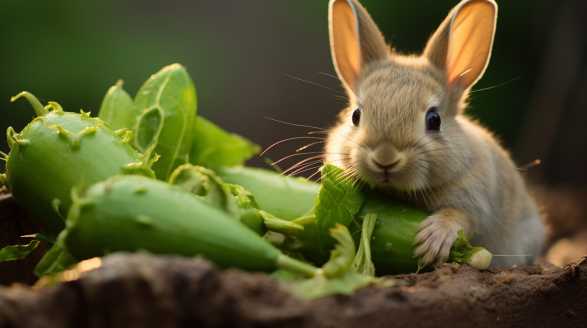
Can Rabbits Eat Okra
Introduction Can Rabbits eat okra? Let’s find out. We’re about to embark on an adventure filled with mysteries, health benefits, and the undeniable allure of okra for our furry friends. Picture this: you’re strolling down the vegetable aisle, and your eyes fall upon the vibrant green pods of okra. You’ve heard whispers about this veggie, […]
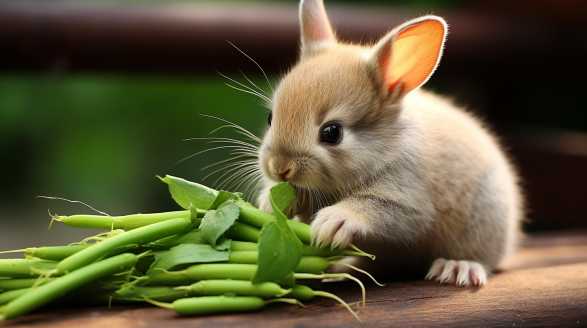
Can Rabbits Eat Green Beans
Introduction Can rabbits eat green beans? Let’s find out. Picture this: fluffy bunnies hopping happily, their noses twitching with anticipation. What could be better than seeing those adorable little creatures nibbling on delicious green beans? Yes, you heard it right! I don’t know about you, but I’ve always been curious about the impact of food […]
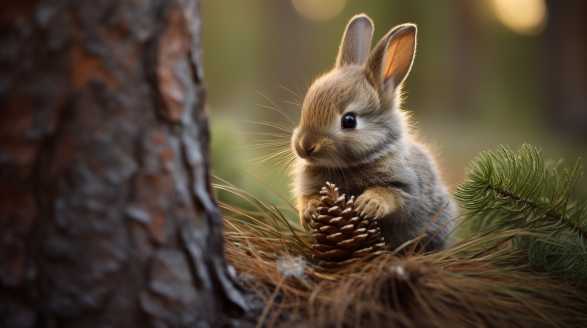
Do Rabbits Eat Pine Cones
Introduction Can rabbits eat pine cones? Let’s find out. Get ready to dive into a world of excitement and discovery as we explore the fascinating topic of feeding pine cones to our furry friends. I couldn’t help but put on my investigative hat and go down the rabbit hole (pun intended) to bring you all […]
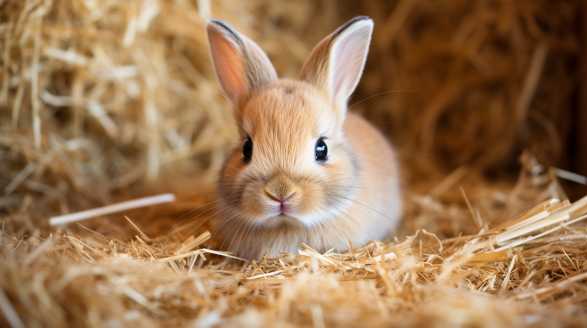
Best Hay For Rabbits
Introduction Hey there, fellow rabbit lovers! What is the best hay for Rabbits? Let’s find out. I’ll be your trusty guide as we explore the different types of hay available for our precious rabbits. We’ll uncover the secrets of Timothy hay, the golden standard for bunny nutrition. The world of hay is vast, my friend, […]
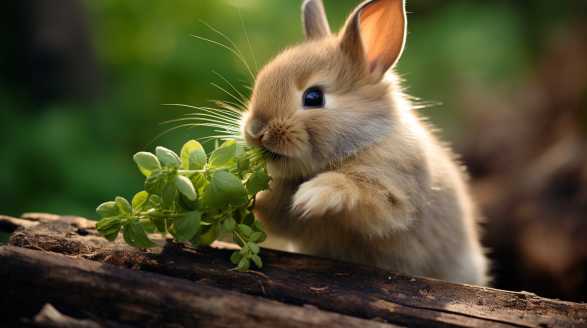
Can Rabbits Eat Oregano
Introduction Hey there, rabbit lovers! If you’re anything like me, you’re constantly on the lookout for ways to keep your furry friends healthy and happy. Oregano isn’t just a delicious herb we sprinkle on our pasta; it has some surprising advantages for our fluffy buddies too! we’ll cover everything you need to know about oregano […]
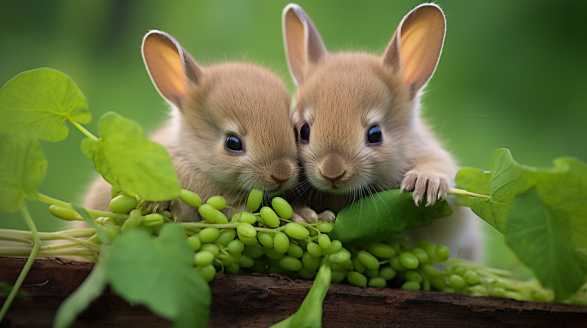
Can Rabbits Eat Snap Peas
Introduction Can Rabbits eat snap peas? Let’s find out. Picture this: a plump, crunchy, and oh-so-delicious snap pea, packed with nutrients that can make your rabbit’s taste buds go wild! But the question on everyone’s mind is, are snap peas safe and beneficial for our furry friends? We’ll explore the incredible benefits of snap peas, […]

